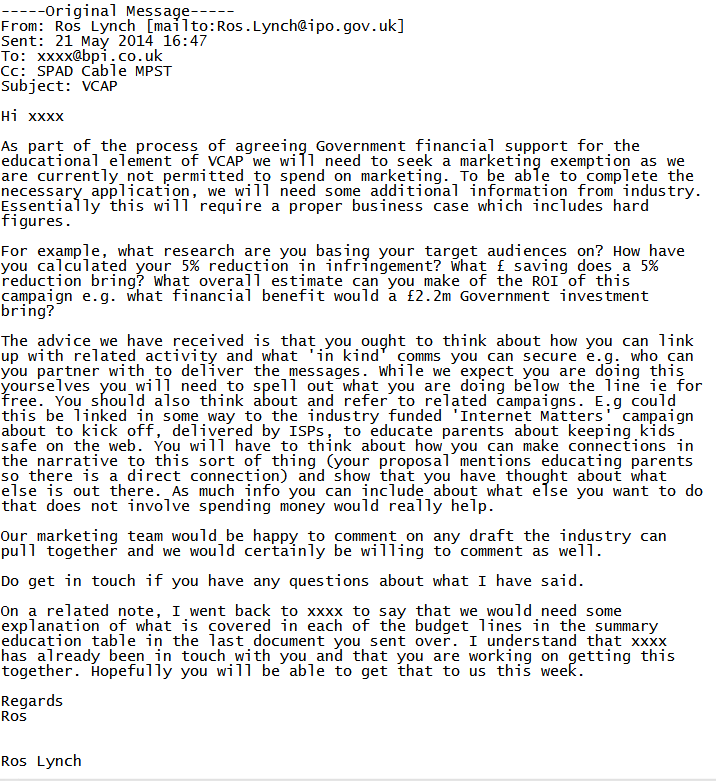Torrentfreak: “Mega Goes Legal, Issues Ultimatum Over Cyberlocker Report” plus 1 more |
| Mega Goes Legal, Issues Ultimatum Over Cyberlocker Report Posted: 25 Sep 2014 02:55 AM PDT
While listing some domains that may well live up to that less-than-flattering billing, the authors of Behind The Cyberlocker Door: A Report How Shadowy Cyberlockers Use Credit Card Companies to Make Millions, also decided to include New Zealand-based Mega. Mega was founded by Kim Dotcom but the site bears little resemblance to his now defunct Megaupload. Perhaps most importantly, Mega was the most-scrutinized file-hosting startup ever, so every single detail simply had to be squeaky clean. As a result the site took extensive legal advice to ensure that it complies with every single facet of the law. Nevertheless, NetNames took the decision to put Mega in its report anyway, bundling the site in with what are described as some of the market’s most dubious players. This was not received well by Mega CEO Graham Gaylard. In a TorrentFreak article he demanded a full apology from NetNames and Digital Citizens Alliance and for his company to be withdrawn from the report. Failure to do so would result in “further action”, he said. TF asked NetNames’ David Price whether his company stood by its allegations. The response suggested that it did and no apology was forthcoming. It’s been a week since that ultimatum and as promised Mega is now making good on its threats. “Mega’s legal counsel has written to NetNames, Digital Citizens Alliance and The Internet Technology & Innovation Foundation (ITIF) stating that the report is clearly defamatory,” Mega CEO Graham Gaylard told TorrentFreak this morning. Given NetNames’ and Digital Citizens Alliance failure to respond, it comes as little surprise that Mega’s formalized demands now go beyond an apology and retraction. Firstly, Mega’s legal team are now demanding the removal of the report, and all references to it, from all channels under the respondents’ control. They also demand that further circulation of the report must be discontinued and no additional references to it should be made in public. That’s a tough one. NetNames’ effort is currently the most-circulated report in the ‘piracy’ space and TorrentFreak is also informed that the paper is set to become the supporting documentation to Hollywood and the labels’ follow-the-money anti-piracy drive. Mega are also demanding a list of everyone who has had a copy of the report made available to them along with details of all locations where the report has been published. Again, that will be an interesting one to see Mega’s targets fulfill. Finally, Mega is demanding a full public apology “to its satisfaction” to be published on the homepages of the respondents’ websites. What form that could take without discrediting the rest of the report is probably up for negotiation, but having Mega in there at all was bound to be a controversial and potentially damaging move. Mega has given the companies seven days to comply with the above requests. No official line has been provided as to what will happen if Mega is met with a refusal, but it seems that the company is serious about protecting its reputation and will do whatever it takes to do that. It’s perhaps of note that to our knowledge none of the other sites listed in the report have come out publicly to protest their inclusion in it. That’s not to say that some weren’t wrongfully included of course, but when a company like Mega stands up in order to protect its brand that should set off alarm bells. Do ‘pirate’ sites with “shadowy” business models ever bother to publicly defend their reputations unless they’re the ones being hauled into court? Source: TorrentFreak, for the latest info on copyright, file-sharing and anonymous VPN services. |
| UK Govt Hopes to ‘Profit’ From Anti-Piracy Measures Posted: 24 Sep 2014 10:16 AM PDT
The Government teamed up with copyright holders and ISPs, who will start sending warning emails to pirating Internet users next year. In addition there will be a broader educational campaign to steer people towards using legal options. While the campaign is a private initiative the Government has decided to back it financially with several million pounds. However, TorrentFreak has learned that the Government funding wasn’t straightforward and was made outside of the available marketing budget. Through a Freedom of Information request we obtained an email conversation between the UK Intellectual Property Office (IPO) and music industry group BPI. In the email from May this year IPO’s Ros Lynch explains that there are no regular marketing funds available to support VCAP. “As part of the process of agreeing Government financial support for the educational element of VCAP we will need to seek a marketing exemption as we are currently not permitted to spend on marketing,” Lynch writes to BPI’s Ian Moss. To be able to get the exception the Government needs additional information from the entertaining industries, showing that the investment makes sense financially. Or put differently, that the Government will see a good return for their invested taxpayer money. “Essentially this will require a proper business case which includes hard figures,” Lynch writes. “For example, what research are you basing your target audiences on? How have you calculated your 5% reduction in infringement? What £ saving does a 5% reduction bring? What overall estimate can you make of the ROI of this campaign e.g. what financial benefit would a £2.2m Government investment bring?”  The above suggests that the BPI is predicting a 5% drop in piracy from the anti-piracy measures. However, in a response to the IPO’s request the industry group writes that even with a lower success rate the Government’s spending will pay off. In a “Summary Business Case” (pdf) BPI uses the expected VAT increase to convince the Government of the “profitability” of the campaign. It estimates that if 15% of all illegal downloads are lost sales, piracy only has to decline 1% over three years for the Government to recoup their investment. “The underlying assumptions are based on very good data that has been produced by Ofcom and by a number of academic studies looking at the replacement ratios. It shows that only very small changes in piracy lead to significant returns to Government,” BPI notes. The music industry group stresses that the calculation only looks at VAT income and that the effects on the wider economy may be even greater. However, the static model they presented should already be good enough to warrant the funding. “So even from a very simple, static assumption, a small reduction in piracy of between .49% and 1% over the three years would return Government investment of £4m in an education scheme,” BPI writes. This prediction was apparently good enough for the Government to invest in the new anti-piracy plans beyond the available marketing budget. Even more so, the authorities committed £3.5 million to the campaign, instead of the £2.2 that was discussed in May. Whether the Government will indeed be able to recoup the taxpayer money through the anti-piracy campaign will be hard to measure, but the plan is going full steam ahead. Source: TorrentFreak, for the latest info on copyright, file-sharing and anonymous VPN services. |
| You are subscribed to email updates from TorrentFreak To stop receiving these emails, you may unsubscribe now. | Email delivery powered by Google |
| Google Inc., 20 West Kinzie, Chicago IL USA 60610 | |
 Last week the Digital Citizens Alliance and NetNames released a new report with the aim of shining light on the business models of "shadowy" file-storage sites.
Last week the Digital Citizens Alliance and NetNames released a new report with the aim of shining light on the business models of "shadowy" file-storage sites.